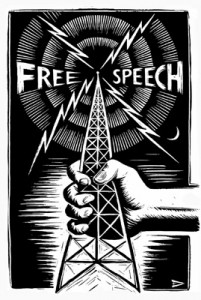On my recently ended radioshow I tried to reguarly to give updates on unlicensed radio. To me it’s one of the still lively modes of civil disobedience in electronic communications, especially in the internet age.
Although there is low-power FM in the US, and a growing community radio movement world-wide, the urge to broadcast without government sanction is still strong and too hard for some resist. For some it’s because a license still isn’t available, and for others it’s because they don’t think they should need a license. And some pirates just don’t even care about the FCC or other regulators in the first place. As we get 2010 off to a start I’d like to take an opportunity to take look at some of the pirate radio news, at least in North America.
FCC Actions Up, Actual Busts not so Much
At least once a year my pal John Anderson at DIYmedia.net does an overview of FCC action against pirates. He finds that in terms of raw numbers 2009 was a record year, with 429 enforcement actions. That number may sound high to many people since we don’t hear too much news these days about pirate broadcasters who aren’t in a movie. But the record is deceptive, since most of the “actions” aren’t busts, where FCC agents employ law enforcement muscle to charge in and confiscate gear. Rather, most of these actions involve unaccompanied visits to suspected transmitter sites and threatening letters.
In fact, John reports that
the number of actual, painful punishments have dropped: five Forfeiture Orders (compared to 13 in 2008); 6 Notices of Apparent Liability (versus 13 in 2008); raid-arrests and seizures remain constant from year-to-year (5/3 in ’09, 5/2 in ’08 – and at least one of the “seizures” last year was voluntary).
Those statistics lead John to conclude that an unlicensed broadcaster has something like an 8 in 10 chance of avoiding any major punishment, aside from a threatening letter delivered via certified mail.
Austin Pirate Says FCC ain’t got Jurisdiction, Still Gets Fine
As John also notes, the year kicks off with the FCC confirming a $10,000 fine it levied against a pirate station in Austin, TX. As RadioWorld observes, the Commission acted with unusual swiftness, marking only five months since the first complaint about the station was registered.
The station continued broadcasting after being notified by the FCC, and contested when issued a Notice of Apparently Liability. Operators Jerry and Deborah Stevens then appealed, telling the FCC that it has no jurisdiction because their station operated only in Texas and could not be received across state lines. Not surprisingly the Commission rejected such an argument that, if accepted, would otherwise completely undermine it’s ability to regulate the vast majority of radio communications.
Collecting on that fine…. well, that’s another issue.
Ottawa up in Arms over Strip Club Pirate
Up in the Great White North it appears that quite a number of folks are in a tizzy over a station operated by a teenage boy out of the back of his father’s strip club in Ottawa. According to the London Free Press the station received a cease-and-desist order in early December, went off the air, then started up, and went off again on Dec. 14. Finally, on Christmas Eve, the station returned to the air, and apparently continues broadcasting.
Aside from being unlicensed there don’t seem to be any complaints about the station’s programming, which is characterized as “pop music around the clock.” Apparently the strip club has little influence, or if it does, nobody minds that.
Canadian consumer electronics website Digital Home files the most strident grievance with the station while trotting out the reddest herring in the anti-pirate’s rhetorical arsenal alongside a good old-fashioned dose of fear mongering:
Although many will consider the operation of an illegal radio station as nothing more than a youthful act of rebellion, the reality is that operating an unlicensed radio station can be dangerous since it can possibly jam communications at surrounding airports, interfere with commercial radio signals, and even emit dangerous radiation to individuals near the transmitter.
Certainly this tired old saw of aircraft interference has been repeated time and again by authorities looking to sway public opinion against otherwise harmless unlicensed broadcasters. But the fact of the matter is that the danger of is minute, and much more of a threat from licensed stations at the top end of the dial operating out of spec using kilowatts of power than with any pirate operating with tens of watts.
The radiation argument is so absurd that I seriously wonder if the writer knows anything about radio transmitters at all. Yes, it’s true that you don’t want to get too close to a aerial transmitting a signal at 1000 watts or more, lest you suffer what are known as RF burns. But most pirates operate between one and a hundred watts, comparable to cell phones at the low end and amateur radio transceivers at the high end. Furthermore, these are FM signals operating at relatively long wavelengths of 91.9 MHz, not gamma rays, X-Rays or even microwaves.
Look out Ottawa! Strip club pirate’s gonna give you cancer while planes drop out of the sky around you!
That’s all for this time. Next up, we’ll see what’s happening across the pond in the UK and Ireland.



